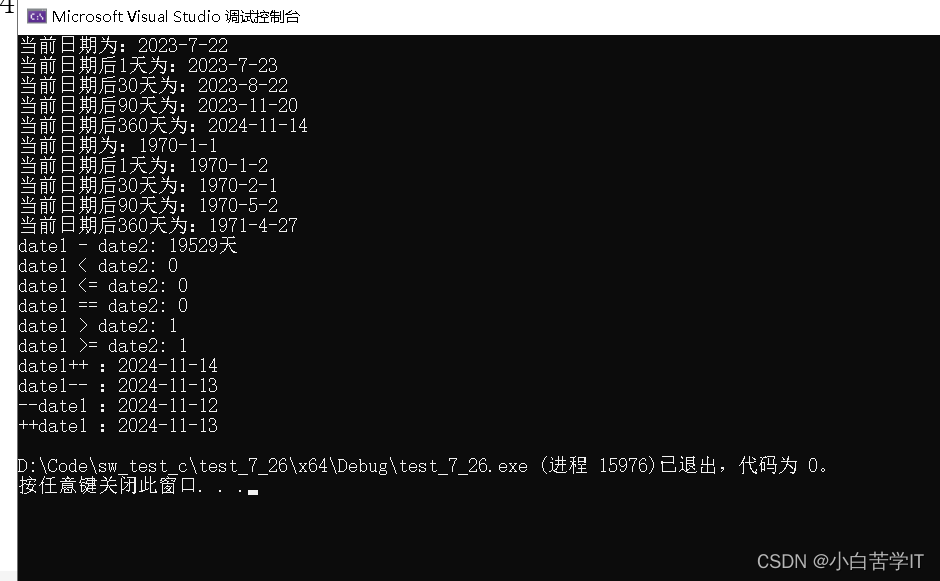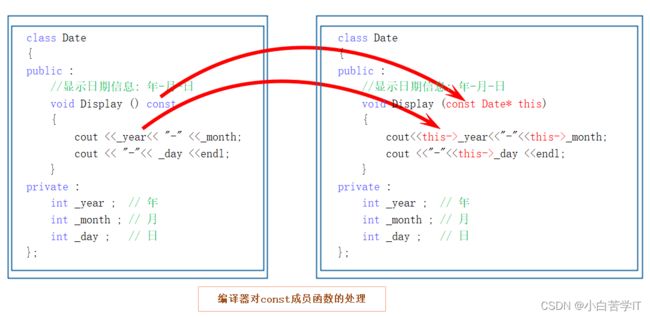C++——类与对象(中)
目录
- 类的6个默认成员函数
- 构造函数
- 析构函数
- 拷贝构造函数
- 赋值运算符重载
- const成员函数
- 取地址及const取地址操作符重载
1.类的6个默认成员函数
如果一个类中什么成员都没有,简称为空类。
空类中真的什么都没有吗?并不是,任何类在什么都不写时,编译器会自动生成以下6个默认成员函数。
默认成员函数:用户没有显式实现,编译器会生成的成员函数称为默认成员函数。
class Date {};
2. 构造函数
2.1概念
class Date
{
public:
void Init(int year, int month, int day)
{
_year = year;
_month = month;
_day = day;
}
private:
int _year; // year_ mYear
int _month;
int _day;
};
对于Date类,可以通过 Init 公有方法给对象设置日期,但如果每次创建对象时都调用该方法设置信息,未免有点麻烦,那能否在对象创建时,就将信息设置进去呢?
构造函数是一个特殊的成员函数,名字与类名相同,创建类类型对象时由编译器自动调用,以保证每个数据成员都有 一个合适的初始值,并且在对象整个生命周期内只调用一次。
2.2 特性
构造函数是特殊的成员函数,需要注意的是,构造函数虽然名称叫构造,但是构造函数的主要任务并不是开空间创建对象,而是初始化对象。
其特征如下:
- 函数名与类名相同。
- 无返回值。
- 对象实例化时编译器自动调用对应的构造函数。
- 构造函数可以重载
class Date
{
public:
// 1.无参构造函数
Date()
{}
// 2.带参构造函数
Date(int year, int month, int day)
{
_year = year;
_month = month;
_day = day;
}
private:
int _year;
int _month;
int _day;
};
void TestDate()
{
Date d1; // 调用无参构造函数
Date d2(2023, 8, 2); // 调用带参的构造函数
// 注意:如果通过无参构造函数创建对象时,对象后面不用跟括号,否则就成了函数声明
// 以下代码的函数:声明了d3函数,该函数无参,返回一个日期类型的对象
// warning C4930: “Date d3(void)”: 未调用原型函数(是否是有意用变量定义的?)
Date d3();
}
- 如果类中没有显式定义构造函数,则C++编译器会自动生成一个无参的默认构造函数,一旦用户显式定义编译器将不再生成。
class Date
{
public:
/*
// 如果用户显式定义了构造函数,编译器将不再生成
Date(int year, int month, int day)
{
_year = year;
_month = month;
_day = day;
}
*/
void Print()
{
cout << _year << "-" << _month << "-" << _day << endl;
}
private:
int _year;
int _month;
int _day;
};
int main()
{
// 将Date类中构造函数屏蔽后,代码可以通过编译,因为编译器生成了一个无参的默认构造函
数
// 将Date类中构造函数放开,代码编译失败,因为一旦显式定义任何构造函数,编译器将不再
生成
// 无参构造函数,放开后报错:error C2512: “Date”: 没有合适的默认构造函数可用
Date d1;
return 0;
}
- 无参的构造函数和全缺省的构造函数都称为默认构造函数,并且默认构造函数只能有一个。
注意:无参构造函数、全缺省构造函数、我们没写编译器默认生成的构造函数,都可以认为是默认构造函数。
3.析构函数
3.1概念
通过前面构造函数的学习,我们知道一个对象是怎么来的,那一个对象又是怎么没呢的?
析构函数:与构造函数功能相反,析构函数不是完成对对象本身的销毁,局部对象销毁工作是由编译器完成的。而对象在销毁时会自动调用析构函数,完成对象中资源的清理工作。
3.2特性
析构函数是特殊的成员函数,其特征如下:
- 析构函数名是在类名前加上字符 ~。
- 无参数无返回值类型。
- 一个类只能有一个析构函数。若未显式定义,系统会自动生成默认的析构函数。注意:析构函数不能重载
- 对象生命周期结束时,C++编译系统系统自动调用析构函数。
4. 拷贝构造函数
概念
在创建对象时,可否创建一个与已存在对象一某一样的新对象呢?
拷贝构造函数:只有单个形参,该形参是对本类类型对象的引用(一般常用const修饰),在用已存在的类类型对象创建新对象时由编译器自动调用。
特征
拷贝构造函数也是特殊的成员函数,其特征如下:
- 拷贝构造函数是构造函数的一个重载形式。
- 拷贝构造函数的参数只有一个且必须是类类型对象的引用,使用传值方式编译器直接报错,因为会引发无穷递归调用。
- 若未显式定义,编译器会生成默认的拷贝构造函数。 默认的拷贝构造函数对象按内存存储按字节序完成拷贝,这种拷贝叫做浅拷贝,或者值拷贝。
- 拷贝构造函数典型调用场景:
使用已存在对象创建新对象
函数参数类型为类类型对象
函数返回值类型为类类型对象
5.赋值运算符重载
C++为了增强代码的可读性引入了运算符重载,运算符重载是具有特殊函数名的函数,也具有其返回值类型,函数名字以及参数列表,其返回值类型与参数列表与普通的函数类似。
函数名字为:关键字operator后面接需要重载的运算符符号。
函数原型:返回值类型 operator操作符(参数列表)
注意:
不能通过连接其他符号来创建新的操作符:比如operator@
重载操作符必须有一个类类型参数用于内置类型的运算符,其含义不能改变,例如:内置的整型+,不 能改变其含义作为类成员函数重载时,其形参看起来比操作数数目少1,因为成员函数的第一个参数为隐藏的this。
#define _CRT_SECURE_NO_WARNINGS 1
#define _CRT_SECURE_NO_WARNINGS 1
#include 6.const成员
将const修饰的“成员函数”称之为const成员函数,const修饰类成员函数,实际修饰该成员函数隐含的this指针,表明在该成员函数中不能对类的任何成员进行修改。
8.取地址及const取地址操作符重载
class Date
{
public :
Date* operator&()
{
return this ;
}
const Date* operator&()const
{
return this ;
}
private :
int _year ; // 年
int _month ; // 月
int _day ; // 日
};
这两个运算符一般不需要重载,使用编译器生成的默认取地址的重载即可,只有特殊情况,才需要重载,比如想让别人获取到指定的内容!


